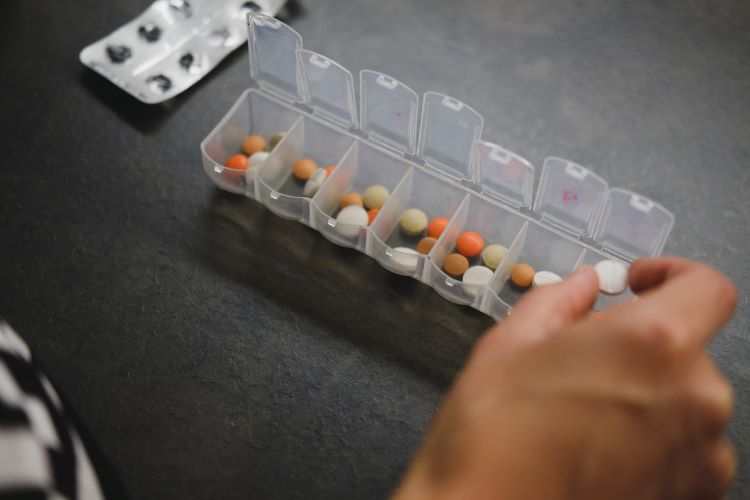Acamprosate for the Treatment of Alcoholism
Quick links for Acamprosate in Alcohol Detox
- Acamprosate and alcoholism
- Alcohol and the brain
- Where Acamprosate comes in
- Prescribing Acamprosate for alcohol detox
- Acamprosate uses during alcohol detox
- What are the benefits of Acamprosate?
- What are the side effects of Acamprosate?
- Getting help with Acamprosate
- References for Acamprosate for alcohol detox
Acamprosate, also known by its brand name Campral, is a medication used to treat alcohol use disorder.
It is usually administered following an individual’s successful recovery where they no longer consume alcohol regularly.
Unlike Benzodiazepine prescriptions which aim to reduce the effects of alcohol withdrawal symptoms, acamprosate helps people resist the urge to drink following a successful detox.
The substance is not intended to ‘cure’ alcoholism. Instead, it is a treatment method that is most effective when part of a wider alcohol abuse recovery plan, alongside safe detox and therapy.
There is growing evidence to suggest that a combination of psychosocial intervention and medicinal treatment is the most effective method for alcohol dependence recovery, and Acamprosate relies on this balance in order to be effective.
Acamprosate and alcoholism

Person taking Acamprosate for alcohol detox
When an individual undergoes drug and alcohol rehab, they spend weeks or months detoxing from alcohol.
This involves breaking their body’s dependence on the substance, as well as the individual learning how to construct a healthier relationship with alcohol.
During this period, individuals go through various methods of psychosocial intervention, designed to help them recognise the faults in their behaviour, and learn how to better respond in future.
These treatments include Cognitive Behavioural Therapy (CBT) and support groups.
While effective, these treatments are often unable to prevent an individual from relapsing once they are back in the real world. Within a year of successfully detoxing from alcohol, it is thought that most people relapse at least once [1].
As a result of this, Acamprosate can be an effective post-rehab treatment. It can be administered to help limit the impact of this initial relapse and stop an individual from losing all of their hard-earned progress.
Alcohol and the brain

Man suffering from the effects of alcohol on the brain
After frequent or chronic use, alcohol severely alters the brain’s chemistry. Specifically, it affects the glutamate neurotransmitter by reducing its activity, [2] resulting in an overall sedative effect in the brain.
This interaction creates the relaxed, pleasurable effect of drinking alcohol, and an individual who is addicted to alcohol seeks to maintain this relaxed sensation by frequently consuming more of it.
When an individual stops drinking, and alcohol become absent in the body, the glutamate neurotransmitter becomes incredibly active.
This change quickly creates the opposite effect and makes the central nervous system hyperactive.
This excitability of the body causes an individual to become uncomfortable, triggering an array of withdrawal symptoms such as shaking, nausea, and diarrhoea. The following discomfort incentivises them to consume alcohol in order to feel its sedative effect again.
In this way, alcohol corrupts the brain’s reward system by forcing it to sustain its strong association between alcohol and pleasure. The absence of alcohol is excruciating, and so the individual must keep drinking alcohol in order to feel good.
Where Acamprosate comes in

Two people discuss the use of Acamprosate for alcohol detox
When this process occurs, Acamprosate looks to step and stabilise the brain’s chemistry.
Its exact process of action is not fully understood, but it is thought that the drug counteracts the effects of alcohol withdrawal by bringing the activity of the glutamate neurotransmitter back to normal levels. [3]
It reduces its activity and prevents the body from becoming hyperactive. In this way, Acamprosate denies the brain the positive reinforcement associated with drinking alcohol as an individual no longer feels the urge to consume alcohol in order to feel better.
The perceived ‘high’ of alcohol consumption is dampened as its sedative effect is no longer required, and the brain is therefore not compelled to consume it again.
After chronic alcohol use, the brain’s perception of alcohol is twisted. It sees the substance as the cure to its pain, and therefore cannot independently refrain from consistently using it.
Acamprosate normalises this perception by taking away alcohol’s power.
Through this chemical rebalancing, Acamprosate has also been known to limit the impact of alcohol withdrawal syndrome, [4] particularly symptoms such as insomnia and anxiety.
Prescribing Acamprosate for alcohol detox

Doctor typing out a prescription for Acamprosate in an alcohol detox
Acamprosate should only be administered to an individual following inpatient or outpatient rehab when they successfully stopped their alcohol use.
The drug is designed to help an individual maintain their progress and prevent them from returning to drinking, not to stop their addiction when it is at full strength.
Acamprosate should only be used under the supervision of a medical professional, and this is due to the possible effects it may have on certain individuals.
For example, those who are pregnant or have kidney issues are not recommended to use Acamprosate. [5]
In most cases, the drug tends to be used for a year following rehab, as this tends to be the most vulnerable period for newly recovered individuals.
However, there are several factors which a medical professional may take into consideration when determining how long it should be administered for. These include:
- How frequently an individual has cravings for alcohol
- How successful an individual’s support network is
- How long an individual has spent in rehab
- How successful aftercare activities have been, such as counselling and support groups
Acamprosate uses during alcohol detox

Patient talking with a healthcare worker about using Acamprosate during alcohol detox
Commonly, Acamprosate is taken orally several times a day.
Individuals can take it with or without food, although it is recommended that they develop a routine of taking it with each meal in order to keep track of how many are taken throughout the day.
As previously mentioned, Acamprosate is not a cure for alcoholism
It is most effective when used in conjunction with other alcohol recovery treatments and medicines, including Disulfiram.
The importance of aftercare cannot be understated. Activities such as therapy and support groups work alongside Acamprosate to ensure that initial setbacks do not result in full-scale relapses.
What are the benefits of Acamprosate?

People talking about the benefits of Acamprosate for alcohol detox
There are many medications used to treat different aspects of alcohol addiction, but Acamprosate is considered to be one of the safest.
The substance is absorbed into the body via the digestive system instead of through the liver, meaning it reduces many of the negative effects that other medications may cause.
Alcoholism often causes severe damage to an individual’s liver.
The organ is largely responsible for filtering the substance, and alcohol abuse can destroy liver cells and inhibit the organs’ ability to generate new ones as a result.
Following significant alcohol consumption, an individual’s liver might be weak or susceptible to damage. Medications that avoid going through the liver, therefore, avoid the potential for any further harm to be caused, as well as enhance their own efficiency.
Furthermore, the route which Acamprosate takes into the body means that it does not interact with any other medications. This further reduces the potential for negative effects.
What are the side effects of Acamprosate?

Person suffering from the side effects of Acamprosate during alcohol detox
Despite the benefits of Acamprosate, it can have side effects just like other alcohol abuse medications.
These tend to be short-lived and mild, but they can be serious in some instances. Possible side effects include: [6]
- Feeling sick, including nausea and vomiting
- Stomach problems, including flatulence and diarrhoea
- Insomnia and restlessness
- Increased anxiety
- Depression and suicidal thoughts
- Increased heart rate
- Hearing and sight problems
- Dizziness, fainting, and feelings of weakness
- Loss of appetite
Getting help with Acamprosate

Person looking for help using Acamprosate during alcohol detox
Acamprosate is a medication only prescribed following a successful detox from alcohol dependence.
It is also ineffective on its own and must be used in conjunction with other recovery treatments.
Those who are struggling with alcohol use disorder are encouraged to contact their GP or an alcohol support organisation to discuss how to begin their recovery journey.
You can locate rehabs in your area here.
References for Acamprosate for alcohol detox
[1] https://www.ncbi.nlm.nih.gov/pmc/articles/PMC3277871/
[2] https://www.niaaa.nih.gov/publications/alcohol-and-brain-overview
[3] https://www.ncbi.nlm.nih.gov/pmc/articles/PMC3277871/
[4] https://pubmed.ncbi.nlm.nih.gov/16930211/
[5] https://pubmed.ncbi.nlm.nih.gov/30152012/
[6] https://www.royalfree.nhs.uk/patients-and-visitors/patient-information-leaflets/acamprosate






